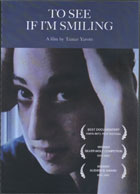
To See If I’m Smiling 2007
Distributed by Women Make Movies, 462 Broadway, New York, NY 10013; 212-925-0606
Produced by Tamar Yarom
Directed by Tamar Yarom
DVD, color, 60 min.
Sr. High - Adult
Middle Eastern Studies, Military Studies, Women's Studies, Gender Studies, Human Rights, Psychology, Arab/Israeli Conflict
Date Entered: 11/21/2008
ALA Notable: ALA.gif
Reviewed by Malcolm L. Rigsby, Department of Sociology, Ouachita Baptist University, Arkadelphia, AR
Yarom, herself an Israeli who experienced firsthand the “shock” that many young women experience in their mandatory two-year service in the Israeli Defense Force (IDF), leads the viewer in a most intimate expose of what it is like for many young women serving Israel in the Occupied Territories. A 1999 graduate of the London Film School, she expertly blends her knowledge of psychology with her film making skills to focus on the individual experiences of seven young women. It is as if the viewer is attending a one to one discussion with each individual.
Yarom denies that the film is a political statement. This viewer concludes that there is much to be done in both preparing young Israeli women to serve in their IDF capacity and to reintegrate them back into society. Therefore, the film leads the studious viewer to consider the possible means by which to resolve moral and psychological changes that occur during service in the IDF. Although Yarom does not directly interview young men serving in the IDF, it is evident from several segments that the resolution relates to not only women and their experience but men also.
We enter and exit the film with focus upon Meytal (the Medic), “sometimes I feel a little crazy, I have all these memories”. She entered service optimistic and seeking to do her duty ideally. She wanted to be in the action and play the important role. However, in the introductory remarks it is clear that she is speaking in retrospect and somehow things did not work the way she planned. In the beginning filled with spirit and seeking to obtain medical training, but as her photo on the cover of the DVD film case reveals this is not the end result; at least not as she had desired.
First-time experiences of each individual tell of such reality it is easy to empathize. Perhaps most stark in reality is the statement by Rotem (the Observer) who after sending troops to arrest some youth throwing rocks must only later go to the supervisor and sign her statement that the boy being held was one of the youth she reported. Her self-doubt is evident; what if it was not this youth? She asks her supervisor, “What if I cannot sign the statement that this was the youth I saw on the camera?” “What if he won’t confess?” The solemn response “He will!” is most sobering. Her face and body language as she wrests with this experience tells the viewer much.
As each story unfolds, the viewer must stop and think. The obvious question arises in each instance, “What would I do if experiencing this?”
The film indirectly raises questions concerning human rights and how people who under circumstances of higher control must conform although their moral stance is opposed to the behavior. Perhaps the greater question is what may and/or should be done to reintegrate soldiers in the IDF back into the social system within Israel.
This film could be greatly enhanced by a chapter menu to enable the prompt replay of each interviewee’s initial interview. Later cross-referenced interviews in the last quarter of the video could be left as one chapter. Chaptering the interviews may be helpful to educators and even the individual viewer and allow back up without having to go to the very beginning of the film. This is minor and may be easily added to the DVD.
Cinematography and editing is very good. The voice sound quality is good and the music is stark. The director, Tamar Yarom, and her crew provide a quality presentation worthy of the awards that this film has earned.
Questions of interest for discussion:
- What may the IDF be doing to reintegrate troops into society?
- How do morals and war ethics differ, or do they?
- What types of follow-up surveys are in use to measure troop reintegration into society?
Awards:
- Int’l Documentary Film Festival, Amsterdam (IDFA) – Silver Wolf & Audience Award
- Hot Docs – Special Jury Prize: International Documentary Feature
- Haifa Int’l Film Festival – Best Documentary
- Sarasota Film Festival – Special Documentary Jury Prize